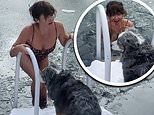Did power cut silence anti-shark alarm before British man was savaged by great white?
- Power cut stopped shark spotters sounding siren
- Accountant had gone for a dip at beach despite warnings
- In 'critical' condition after losing right leg and part of left foot
- Rescuers saved his life with makeshift tourniquet using wetsuit
- 10m Great White also went for rescuers - but was distracted by a seal
A power cut could have prevented a shark spotter from sounding a warning alarm just before a British swimmer was savaged by a great white off the coast of Cape Town in South Africa, it has been claimed.
A shark spotter is thought to have seen 43-year-old Michael Cohen enter the water and attempted to warn him of danger - but the siren didn't work because of a city-wide power cut, it has been reported.
According to South Africa's Daily News website, an official incident report from the City of Cape Town claimed there was an electricity failure with the power company Eskom.

In shock: Michael Cohen in the water seconds after the attack by a 10ft Great White shark off a beach in Cape Town
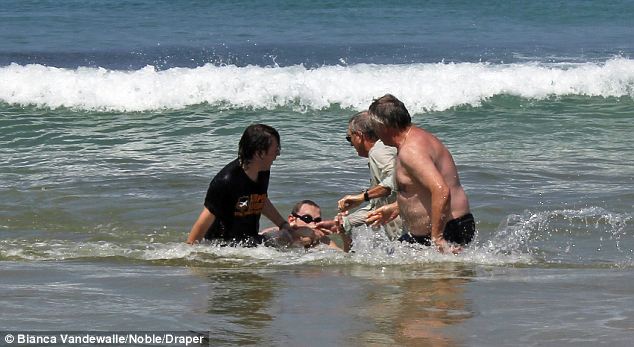
Dragged to safety: Mr Cohen is pulled ashore while the shark is still circling nearby
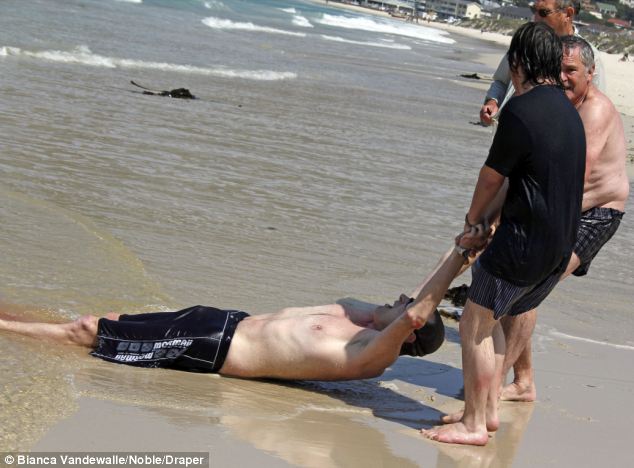
Alive - but only just: Mr Cohen leaves a trail of blood as anxious rescuers pull him from the sea
The report said: 'At around 12.25pm (on Wednesday), the mountain shark spotter saw a swimmer enter the water near the Clovelly Corner area.

Regular swimmer: Michael Cohen, 42, is an accountant who previously lived in Chiswick, west London, before moving to South Africa
'The spotter tried to sound the alarm, but due to an Eskom-related city-wide electricity failure, the alarm did not sound.'
Eskom were unable to comment as the company said it was unaware of the City of Cape Town's incident report.
An Eskom spokeswoman confirmed a power cut lasted for two hours, starting from just before 11am to shortly after 1pm. It was apparently caused by a trip on the power line supplying Cape Town.
However, they were unable to comment on the possible impact this had on the shark alarm as they unaware of the authority's incident report.
Meanwhile a seal has emerged as an unlikely saviour by apparently helping Michael Cohen as he was attacked by the shark.
Two men who dragged Mr Cohen to shore described how the creature swam around them as if to distract the 12ft Great White, which appeared to be preparing for a second strike.
Mr Cohen, who lost his right leg and part of his left foot, yesterday remained in a critical condition in hospital.
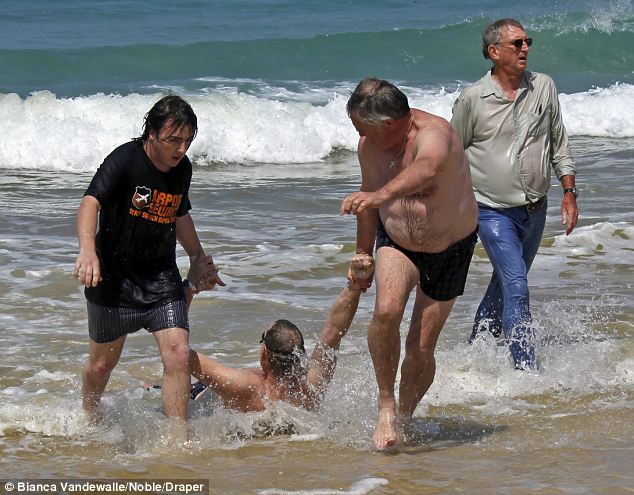
Back ashore: Mr Cohen is dragged on to Clovelly Beach immediately following last Wednesday's attack

Is this the culprit? This image of a Great White was taken close to where Mr Cohen was attacked. It was taken by shark spotters monitoring the area this week
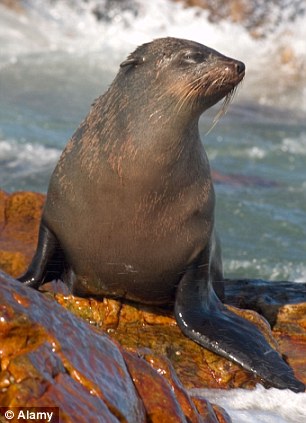
Creating a diversion: A seal was on the scene as Mr Cohen was pulled from the water
Surgeons paid tribute to the remarkable first-aid treatment he received when a shark-spotter tied his belt and wetsuit shorts around the 42-year-old’s injured legs as improvised tourniquets – stopping him from bleeding to death.
Mr Cohen, an accountant, had ignored warnings of a shark in the area before taking to the water off Fish Hoek beach.
Yesterday, passers-by Hugh Till and Douglas Drysdale told how they ran into the blood-clouded surf to help pull the stricken swimmer to safety after watching the attack.
The pair modestly played down their own heroics, but highlighted the surprising role of the seal.
‘As Douglas and I were pulling him in towards the shore, the seal frolicked nearby, and kept swimming past us, it seemed rather agitated.
‘It occurred to us afterwards how unusual it was for a seal to stick around in an area where a shark is, or where there is blood.
‘It really did feel to us as though he was offering support to us, or the swimmer, and was prepared to act as a diversion if the shark went after us as well,’ Mr Till said.
The 66-year-old was in the area with his friend Mr Drysdale, 61, trying to spot whales when they saw the shark looming towards Mr Cohen, who was swimming a few yards from the beach.
They stopped their car and ran to shout warnings, but it was too late, leaving them to watch helplessly as he was pulled under.

Beach rescue: Medics treat Michael Cohen's injuries, using makeshift tourniquets to stem the blood flow from his legs

Drama: Members of the Fish Hoek emergency services stretcher Mr Cohen from the beach to a helicopter
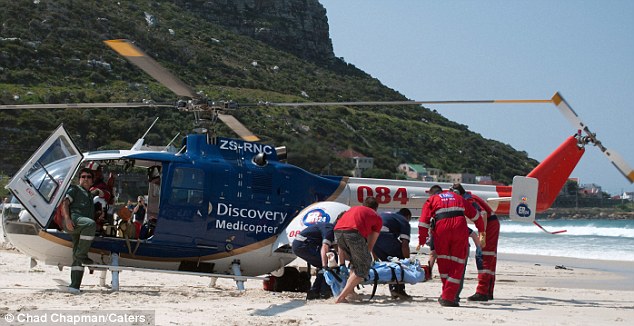
Airlift: Mr Cohen is taken to hospital in Cape Town where he was expected to undergo around six hours of surgery
Even though the shark remained in the area, possibly preparing for a second strike, the two men plunged into the water to help in the efforts to drag Mr Cohen to safety.
Professor Andrew Nicol, who operated on the swimmer, said he had needed seven litres of blood on arriving at hospital.
He had fought to save one of the Briton’s legs, even though it was badly bitten, because he had lost the other leg.
Mr Cohen’s femoral artery and vein were both torn – usually a fatal injury – and Professor Nicol praised the life-saving first-aid efforts by a member of the beach’s shark-spotting team.
‘The tourniquet resulted in the almost complete stopping of blood loss from the thigh and I just want to commend the people giving first aid on the beach for saving the life of this patient,’ he said.
‘Self-made improvised tourniquets don’t tend to work and are frowned on in medical literature, but this really was life-saving. If the femoral artery and vein are both severed you don’t tend to make it into hospital alive.’
He said the parents of Mr Cohen, who is single, had been by his bedside. ‘They are extremely traumatised by what’s happened and realise the seriousness of his condition.’
The Canadian-born accountant, who has a British passport and lived in London before moving to South Africa, had taken to the water even though the beach was closed after shark sightings.
He was said to be a regular swimmer at the beach, who had previously ignored warnings to stay out of the water.
The site of the attack is close to one of the highest populations of Great Whites in the world, and has seen a number of deaths and injuries to swimmers and surfers.
Last night, experts said the seal had been nearby. Craig Lambinon, of the National Sea Rescue Institute, said: ‘A shark remained close to the scene throughout medical efforts to save the victim, and it has been confirmed that a seal was swimming close by during the entire episode.
‘Witnesses confirmed the seal circled the men as they gradually waded ashore with the victim in the presence of a shark.’
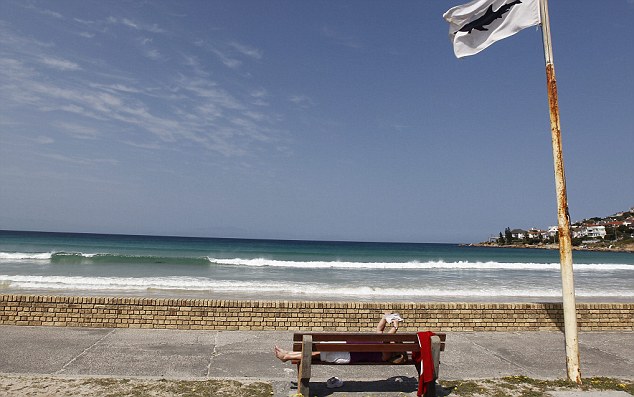
Clear warning: A woman reads a book on a bench beneath a shark warning flag next to the closed Fish Hoek beach in Cape Town, South Africa, where the man was attacked
Most watched News videos
- Road rage Karen learns very painful lesson after attacking man
- Insult to injury for body-slammed road rage Karen in sequel video
- Moment mum drops baby at friend's home before killing herself
- Passerby stops man starting a fire in LA as arsonists are caught
- Ryan Wellings swigs Prosecco after being charged with manslaughter
- OnlyFans Bonnie Blue claims she had sex with '1,057 men in 12 hours'
- Ryan Wellings cleared of manslaughter after fiancee took her own life
- Terrifying moment capybara attacks young girl bathing in a lake
- Retired actress passed away from fire that left Cadillac untouched
- Meghan and Harry meet with wildfire victims in Pasadena
- Cop yanks coyote from grocery store refrigerator
- Honduras woman attempts to set 3-year-old daughter on fire

































































































































































































































